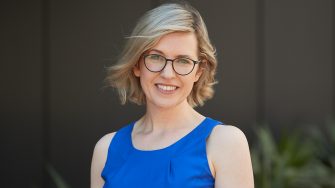UNSW’s Kaldor Centre is combining firepower with the UNSW Canberra Business School, the Australian National University (ANU), global NGO Talent Beyond Boundaries (TBB) and leading think tank the Regional Australia Institute (RAI) to investigate labour supply and demand in regional Australia – shedding light on what hinders employers in the regions from sourcing talent and what could help skilled refugees to successfully settle into these communities.
RAI CEO Liz Ritchie said as the nation transitions to a low-carbon economy, regional Australia stands at the precipice of a pathway that will supercharge the economy – but that wealth would only be delivered if there was access to skilled workers.
“Nearly 80,000 jobs have been advertised online across regional Australia each month this year, and there are around 40% more advertisements in the labour market now, compared to the monthly average for 2019. Skilled migrants can play a vital role in helping fill those positions,” Ms Ritchie said.
“The regions are undergoing a renaissance. Not only are more people choosing a life in regional Australia, but regional economies are evolving and maturing. This will only continue as the nation moves towards net zero emissions in the decades to come.”
The world-first project will be launched in the regional NSW city of Wagga Wagga today, coinciding with Refugee Week, and is supported by the Federal Government through the Australian Research Council’s Linkage program.
The four-year initiative, which will involve research in every state and territory, aims to inform the design of an evidence-based, scalable, employer-sponsored displaced talent migration program that fits the needs of both regional Australian communities and refugees ready to contribute from a safe new home.
It is hoped the research will bring new vitality to communities seeking skilled workers, as well as safety and opportunity for individuals who need it most.
Chief Investigator Dr Claire Higgins, from UNSW’s Kaldor Centre, said that at this time of rising global displacement, the research could have real significance for Australia’s contribution to global refugee protection.
“By enabling some refugees to move onward and build new lives in Australia, skilled migration opportunities can ease the pressure on countries that are hosting many thousands of refugees,” Dr Higgins said.
“Our ground-breaking research will assess how the needs of employers and refugees can align, to scale a system that delivers social and economic benefits for Australia.”
Chief Investigator Dr Sally Baker, from ANU, said that expanding skilled labour mobility was an important way of helping the Australian Government realise its ambition to bring an additional 10,000 refugees through ‘complementary humanitarian pathways’.
“Sharing the opportunity of resettling talented and qualified refugees with employers in areas and professions that have critical gaps has huge potential to help shift the dial on many fronts. However, it requires careful attention to the communication of the opportunity, as well as developing and strengthening ‘arrival infrastructures’ in regional areas that are relatively new to resettling people with forced migration experiences, and this is what our study will examine,” Dr Baker said.
Australia and New Zealand Co-Director of Talent Beyond Boundaries, Jemma Bailey, said the research will draw on the experience of the Skilled Refugee Labour Agreement Pilot, an innovative program that opens skilled migration pathways to refugees and displaced people.
“There is an enormous depth of talent and skills within refugee communities that could bring vitality to regional communities and help to fill skills gaps faced by employers. We have over 100,000 skilled refugees registered on Talent Beyond Boundaries’ Talent Catalogue,” Ms Bailey said.
“We are already working with employers in rural and regional towns around Australia who have recruited skilled refugees through the Pilot and are seeing the benefits.
"This research will be key to ensuring we have the right settings, supports and collaborations in place so we can scale this job-matching to help meet the future workforce and community-building needs of regional Australia.”
Fieldwork relating to the project is expected to get underway next month, with a final report due to be published in 2027.
For more information, contact the Kaldor Centre for International Refugee Law.

